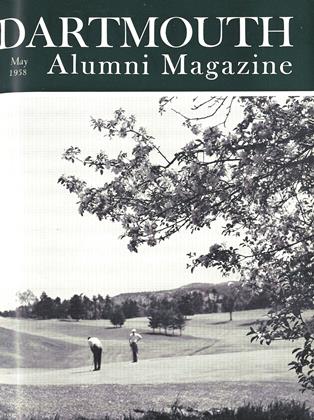THE street sounds to the soldiers' tread, but out we do not troop to see, since Monday afternoon drill for the Air, Army, and Navy ROTC units is a commonplace of the local scene and now no longer raises sparse gray hackles. The prospect of military service is an accepted routine for the present generation, war's alarms - happily not at the moment imminent - having become a habit rather than a thrill, a job rather than a challenge.
We don't recall in much detail the summer of 1861, when the "Dartmouth Zouaves" were organized, nor do we remember much about the Maine in '98, but so far as the impact of armed conflict on the campus is concerned, we have very clear recollections of 1917 and 1943. This is purely local, not taking account of departures and drafts and varied cloak and dagger activities. By 1917, a goodly number of our intimates had gone into the American Field Service and the French and Canadian artillery, but the first war was not a reality for most of us until April. Then - our circle being essentially North Shore and the Sound - almost everyone we knew started organizing "Mosquito Fleets" and electing their own skippers and bo'suns. Others went into agricultural duties, and those of us who remained were shepherded into battalions under the leadership of "Majors" Jigger Pender, Harry Hillman, and Charley Stearns. An invalided and slightly paranoid Canadian infantry captain was imported to teach us the art of crisscrossing the baseball field with trenches, and Joe Myer marched us, in column of squads, into the withering machine-gun fire of an enemy entrenched on the far side of the Reservoir. Only the captain-elect of football refused to enlist, holding, with a hard common sense that has since made him an outstanding educator in New Hampshire's schools, that it was all ineffectual twaddle.
The next year, in spite of War Bond rallies and Kate Smith (or a predecessor) singing "America the Beautiful," general enthusiasm waned, and only the fanatics kept at their close-order drill. But in the fall of 1918, the Student Army Training Corps took complete control and Dartmouth became an armed camp, armed with. Springfields that the Russian forces had rejected probably because the magazines had a knife-edge that cut too deeply into Muscovite shoulders. Fortunately, no ammunition was issued, and our discharge papers read: "Character, excellent; Military capacity, fair; Marksmanship, never fired."
It's nothing to boast that we were idling while many of our only slightly more mature college mates were getting it. S.A.T.C. was popularly known as "Safe at their colleges," while the U.S.N.R.F. (of which we had the honor to be a member) was translated: "You shall never reach France." But World War I was an amateur affair compared with the steadily increasing efficiency of military operations. We take little personal pride in having been assigned as "Supply Sergeant" to count 121 cots twice a day. We claim no glory in attending, as manager pro-tem, football practices during every afternoon's infantry drill, or "making schedules" during every evening study period, or being assigned to KP every time there was an hour exam in Navigation. But the Hanover High School was locally held to be a prime target for Zeppelin bombers, and a taxi driver of Germanic origin was suspected of signalling U-boats in Portsmouth Harbor from Jim Goodfellow's farm in Hanover Center. We knew fear, never; terror, yes.
1942 brought the Navy Indoctrination School, and 1943, the V-ia (or V-5, we've never been sure which). Philosophers were teaching math. Librarians were making maps in Washington. Tuck professors were allotting office equipment to the nation. And Dean Bob Strong was putting up a brave defense for the rights and privileges of the thin red line of under-age boys who were civilian students in an almost uniformly uniformed undergraduate body.
The College may have some moral responsibility in having developed the first X-ray experiments and having first discovered the commercial virtues of petroleum oil, but no matter how you slice it, war is a disrupting mess. The fact remains that never, and uniquely among American colleges, has Dartmouth closed her doors while ignorant armies clashed by night.
 View Full Issue
View Full Issue
More From This Issue
-
 Feature
FeatureThree Civil War Letters
May 1958 By WILLIAM D. HARTLEY '58 -
 Feature
FeatureChronicler of Gettysburg
May 1958 By EDWARD CONNERY LATHEM '51 -
 Feature
FeatureENGINEERING SCIENCE
May 1958 -
 Class Notes
Class Notes1923
May 1958 By CHESTER T. BIXBY, THEODORE D. SHAPLEIGH -
 Class Notes
Class Notes1918
May 1958 By ERNEST H. EARLEY, RICHARD A. HOLTON -
 Article
ArticleWhat Is "New" in the Program?
May 1958 By WILLIAM P. KIMBALL '28
BILL McCARTER '19
-
 Article
ArticleNot So Long Ago .... Peerades
November 1933 By Bill McCarter '19 -
 Article
ArticleThe Hanover Scene
October 1953 By BILL McCARTER '19 -
 Article
ArticleThe Hanover Scene
November 1954 By BILL McCARTER '19 -
 Article
ArticleThe Hanover Scene
February 1955 By BILL McCARTER '19 -
 Article
ArticleThe Hanover Scene
February 1958 By BILL McCARTER '19 -
 Article
ArticleTHE HANOVER SCENE
JANUARY 1959 By BILL MCCARTER '19







